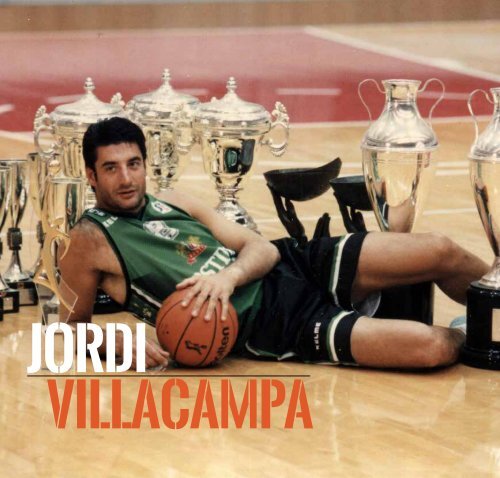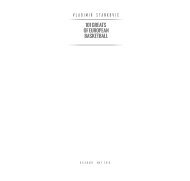JORDI VILLACAMPA - 101 Greats of European Basketball
Create successful ePaper yourself
Turn your PDF publications into a flip-book with our unique Google optimized e-Paper software.
Jordi<br />
Villacampa<br />
375
The 8 who was a<br />
perfect 10<br />
December 22, 1997, was a day to celebrate<br />
a basketball great. Thousands<br />
<strong>of</strong> loyal fans packed Pavello Olimpic in<br />
Badalona, Spain, to pay homage to Jordi<br />
Villacampa, one <strong>of</strong> Joventut Badalona’s<br />
biggest legends. With the club’s ecstatic<br />
fans, and in the presence <strong>of</strong> his many friends and most<br />
influential coaches – including Lolo Sainz, Zeljko Obradovic<br />
and Alfred Julbe – the great Penya captain scored<br />
his last baskets as an active player. With a three-way<br />
tourney between Joventut 1997, Joventut 1994 and FC<br />
Barcelona, Villacampa’s No. 8 jersey was retired and a<br />
brilliant career came to an end.<br />
Today it’s almost impossible for an elite player to<br />
spend his whole career with the same club. Those types<br />
<strong>of</strong> relationships simply do not exist anymore. But Jordi<br />
Villacampa would not have had it any other way. He was<br />
a Joventut player for life, from the junior teams to his<br />
debut in the first team at age 16 until he retired at 35.<br />
He left behind 17 seasons, 506 games in the Spanish<br />
League and 8,991 points scored. That still stands as<br />
the second-best points total all-time in Spain, behind<br />
Alberto Herreros and his 9,759 points, although Villacampa’s<br />
scoring average <strong>of</strong> 17.77 points per game was<br />
better and ranks seventh in Spanish League history.<br />
A Korac Cup champion at 17<br />
As a teenager, Villacampa worked his way into the<br />
Joventut rotation and into club history. On March 19,<br />
1981, at the Palau Blaugrana – the home <strong>of</strong> FC Barcelona<br />
– Joventut played for a continental trophy in the<br />
Korac Cup final. The opponent, Reyer Venezia <strong>of</strong> Italy,<br />
was led by the fearsome duo <strong>of</strong> Drazen Dalipagic and<br />
Spencer Haywood. After a very close duel that saw a<br />
92-92 tie lead to overtime, Joventut won by the slimmest<br />
<strong>of</strong> margins, 105-104. That was the first trophy for<br />
a very young Villacampa, who was not yet 18, having<br />
been born on October 11, 1963, in Reus, Spain. Villacampa<br />
didn’t score in the four minutes he played in the<br />
final, but his head coach, Manel Comas, knew that he<br />
had a star in the making. Earlier that season, Villacampa<br />
had cracked the rotation and was getting minutes<br />
every game. He scored his first 4 points in the Korac<br />
Cup on January 21, 1981, in a Joventut win at Villeurbanne.<br />
Later he scored 8 against Sunair Oostende and<br />
2 points against Crvena Zvezda.<br />
Seven years later, on March 16, 1988, in Grenoble,<br />
France, Villacampa lost a <strong>European</strong> final. Joventut<br />
came up short 96-89 after overtime in the Saporta Cup<br />
final against Limoges. Villacampa led his team with 19<br />
points, Reggie Johnson added 18 and veteran Josep<br />
Maria Margall had 14 points. The Limoges trio formed<br />
by Don Collins (28 points), Stephane Ostrowski (23<br />
points, 11 rebounds) and Clarence Kea (22 points, 8<br />
rebounds) destroyed Joventut’s <strong>European</strong> dream.<br />
One year later Joventut reached the Korac Cup finals<br />
against a Scavolini Pesaro side coached by a young<br />
Sergio Scariolo and led by Walter Magnifico, Ario Costa<br />
and the excellent American duo formed by Darwin Cook<br />
and Darren Daye. Joventut managed to score two wins:<br />
99-98 in Pesaro and 96-86 in Badalona. In the first duel,<br />
Villacampa scored 29 points and in the second 22.<br />
He was backed by Jose Antonio Montero (21 and 28)<br />
and Lemone Lampley (21 and 17). Through these three<br />
<strong>101</strong> greats <strong>of</strong> european basketball<br />
Jordi Villacampa<br />
V
<strong>of</strong> 1985, 1987, 1991 (bronze medal) and 1993 and the<br />
World Cups <strong>of</strong> 1986, 1990 and 1994. In the 1990 edition,<br />
he scored 48 points against Venezuela, which is<br />
still the Spanish national team record. But his brilliant<br />
career could have been even greater with an Olympic<br />
medal.<br />
Vladimir Stankovic<br />
finals, Jordi Villacampa turned into a great player, the<br />
leader <strong>of</strong> a new generation for Joventut and an important<br />
piece on the Spanish national team.<br />
Villacampa made his debut in a national team jersey<br />
on April 27, 1984, in a tournament in Linares, Spain,<br />
where he scored his first 10 points against Poland.<br />
Spain had an impressive team, with Nacho Solozabal,<br />
Andres Jimenez, Juanma Lopez Iturriaga, Juan Antonio<br />
Corbalan, Fernando Romay and Jose Luis Llorente,<br />
among others. It was the same team that would go on<br />
to win the 1984 Olympic silver medal in Los Angeles.<br />
National team coach Antonio Diaz Miguel decided to<br />
leave Villacampa <strong>of</strong>f his final team for the Olympics,<br />
but after that, Villacampa became a mainstay for Spain<br />
and featured in both the Seoul 1988 and Barcelona<br />
1992 Olympic squads. He also played the EuroBaskets<br />
An ideal shooting guard<br />
Standing 1.96 meters tall, Villacampa had the perfect<br />
build for the wing positions. He was fast and could<br />
run the break very well, but his main weapon was his<br />
shot. He had a great touch and was one <strong>of</strong> the first<br />
players to really take advantage <strong>of</strong> the three-point rule<br />
introduced in 1984. In the golden years <strong>of</strong> Joventut,<br />
1990-91 (Spanish League champions after beating<br />
FC Barcelona 3-1) and 1991-92 (champions again, 3-2<br />
against Real Madrid) Villacampa was the undisputed<br />
leader <strong>of</strong> the team. Yes, he had excellent teammates<br />
in Rafa and Tomas J<strong>of</strong>resa, Ferran Martinez, Corny<br />
Thompson, Harold Pressley, Mike Smith and Juanan<br />
Morales, but on every team there is a boss, and it was<br />
clear that Villacampa was the leader for Penya.<br />
Joventut reached the 1992 EuroLeague final but<br />
lost against Partizan Belgrade, 71-70, on the famous<br />
three-pointer by Sasha Djordjevic with a few seconds<br />
left on the clock. Villacampa played all 40 minutes in<br />
that game and scored 13 points, dished 1 assist and<br />
picked up 4 steals, but it was not enough. Somehow,<br />
however, sporting justice was made for this excellent<br />
generation <strong>of</strong> Joventut players. Two years later, at the<br />
Tel Aviv Final Four, Joventut was in the final again, this<br />
time against Olympiacos Piraeus. Penya took the win<br />
this time also by a narrow 59-57 margin behind 16<br />
points by Villacampa in 35 minutes. The dream was<br />
376<br />
377
Caceres in the title game, 79-71. However, Villacampa’s<br />
role in that team had dwindled and he did not have<br />
much presence in the final.<br />
After he retired, as if 17 years with the club were not<br />
enough, Jordi Villacampa took a position on the club’s<br />
board <strong>of</strong> directors as vice president and was finally<br />
elected president on November 29, 1999, a position he<br />
held for 17 years. Under his mandate, Joventut experienced<br />
a second golden era, the highlight <strong>of</strong> which was,<br />
without a doubt, the double crown <strong>of</strong> the 2007-08 season<br />
with the Spanish King’s Cup and the Eurocup Cup<br />
titles, the latter against a nearby opponent, Akasvayu<br />
Girona, by a commanding 79-54 in the final. That win<br />
granted the team a berth in the 2008-09 EuroLeague.<br />
However, there was yet another success, even bigger,<br />
with the everlasting creation <strong>of</strong> talents at the Joventut<br />
Badalona basketball school. The latest examples<br />
were Rudy Fernandez and Ricky Rubio, two players who<br />
have had important roles both at the highest <strong>European</strong><br />
club level and with the Spanish national team. They had<br />
to leave the club for their own sporting ambitions, but<br />
there is no doubt that the Badalona system will produce<br />
new wonders in no time.<br />
Jordi Villacampa; He wore number 8, but on and <strong>of</strong>f<br />
the floor, he’s a perfect 10!<br />
Jordi Villacampa<br />
fulfilled: Jordi Villacampa and his lifelong club were <strong>European</strong><br />
champions.<br />
Villacampa played three more seasons after that<br />
and managed to win another important trophy: the<br />
Spanish Kings’ Cup. In the tournament played in Leon,<br />
Joventut bested Caja San Fernando, Leon and finally<br />
<strong>101</strong> greats <strong>of</strong> european basketball<br />
V
















